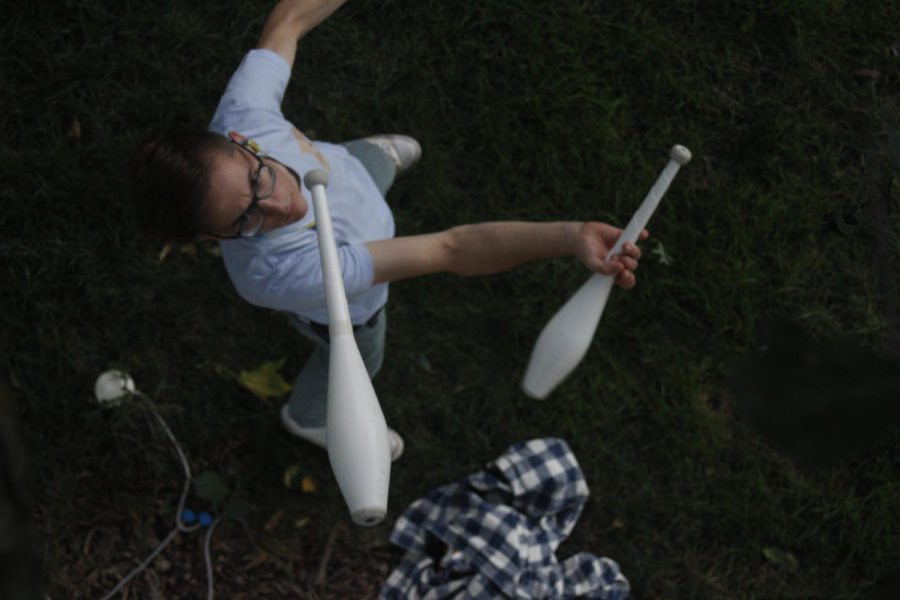Students find mentors and friendship at ISU Juggling
Andy Opp, then-freshman in mechanical engineering and a member of the juggling club, practices his juggling skills on central campus on Sept. 18, 2016.
January 28, 2018
Members of ISU Juggling and Unicycling Club balance all the normal things a college student balances — school, work and a social life.
They also balance clubs, hoops, torches and machetes.
The Juggling and Unicycling Club is dedicated to learning, practicing and innovating a variety of performance skills, from juggling balls, clubs, torches and machetes to hopping over a jump rope on a unicycle. More important than the act of juggling itself is the atmosphere of friendship, acceptance and a willingness to teach expressed by the members.
This may sound a little intense for the average student, but president Jeff Yokup and head of events Rebecca Rehm say they can teach just about anybody and, furthermore, are excited to do so.
“We’ll teach you anything you want, really,” Yokup said.
“It’s a ‘for fun, learn something’ club,” Rehm said.
Both agreed that there is no set in stone learning period for each of the activities offered, so members learn at their own pace. For some, it may take only an hour to learn to juggle three balls — known as “cascading” — but for others it could take a week or more to master.
The club offers far more than just juggling and unicycling, as the name would suggest. Among the different skills practiced in the club are poi, hooping, diabolo, flow-wand, multiple variations of unicycles and a variety of items to juggle. The juggling props range from clubs, balls and rings, and few members can even juggle machetes. They also bring out flaming versions of many of their props for certain performances, like their show for Greek Week last year.
The club performs throughout the year at different events and they try to schedule a few for the more stressful periods, like finals week, to bring lighthearted entertainment to students. They also attend large performance art festivals, such as Mad Fest and Mondo, where they can exchange ideas with other artists.
New members may come to their first practice for the novelty of juggling and performance arts, but many of them stay for the atmosphere and social acceptance offered by the club.
As a transfer student, Yokup said he came to Iowa State not knowing many people or having much involvement on campus. When he saw that there was a juggling club on campus, he decided to attend despite being a little scared to show up.
Today, Yokup has built friendships through the club and currently serves as their president. He says the experience has been an incredibly positive one and he encourages all students who are looking for a new experience and some new friends to stop in for a practice.
Rehm also promotes the social aspect of the club as an important part of her college experience. Coming from a small town, Rehm was the only person she knew who had any interest in poi, a performance art featuring tethered weights that are swung in complex patterns.
When she came to college, she was approached multiple times by members of ISU Juggling and Unicycling who noticed her practicing around campus.
While shy and reserved when she first accepted their invitation to the club, Rehm had positive experiences with older members who taught her new skills and accepted her into their circle. Before coming to the club she had no friends at Iowa State, but after joining, her juggling club mentors were staying late to help her develop her skills.
Not only does she have a network of friends and a significant other that she’s met through the club, she also gets to help new members find their place in the club just as others did for her when she was a freshman.
“I get to be the person who’s there for people and teaching people, and that is the coolest part,” Rehm said. “This club is more important to me than anything else.”
“I feel it,” Yokup said, placing his hand on his heart. The club members expressed more than anything else the strong bonds they’ve built while developing their new skills.
Some members of the club who have already graduated still come back to participate in club activities. When Will Polzin first joined, he had no experience with juggling but he had experimented with the diabolo, a yo-yo like device made up of two sticks attached by a string on which the user spins a dual-sided “axle” to perform various tricks.
When he was a graduate student in aerospace engineering, Polzin saw the club at Clubfest using the diabolo. Although he has moved on from school, he continues to participate in the club meetings to improve his skills and get in some exercise.
Overall, the club members agreed that the best part of their club is that anyone can come in to learn new skills they otherwise wouldn’t have dared to try.
“We have a lot of really talented people here who are willing to teach people free of charge just because they enjoy doing it,” Yokup said. “I think that’s a beautiful thing.”
“The older I get, the more skills I wish I learned as I grew older, so the best part about this is I always learn a new skill and I meet new people,” Rehm said. “There’s always some more to learn and new things to work on. I think as a college student it can be kind of hard to dedicate yourself to something like learning an instrument. There’s something about juggling that like … it’s fun, so it doesn’t feel like a chore to get better.”







